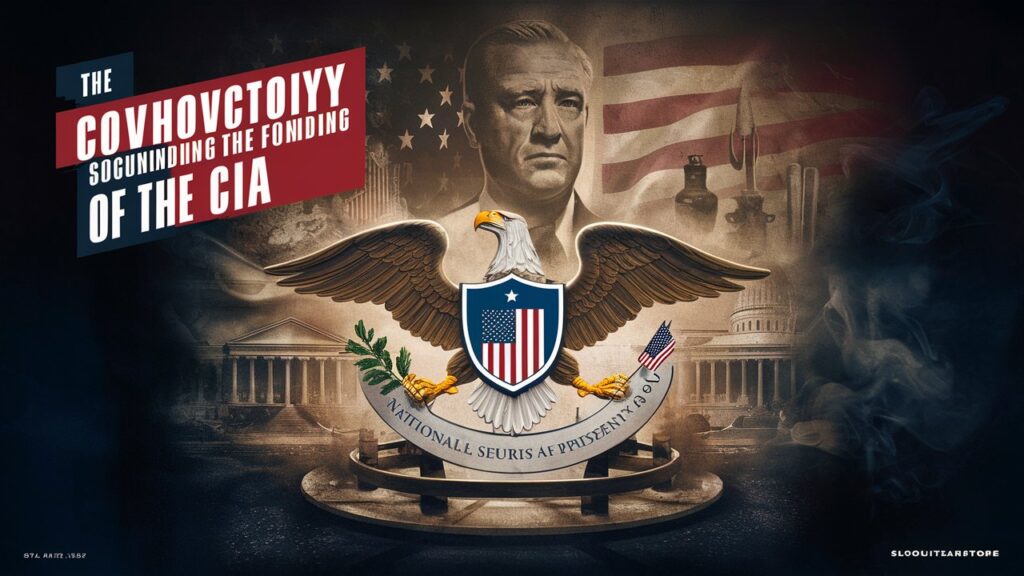The Controversy Surrounding the Founding of the CIA

The Central Intelligence Agency (CIA) is one of the most powerful and secretive agencies in the world, but its creation was far from a simple or straightforward process. The controversy surrounding its founding is tied to geopolitical tensions, security concerns, and questions of legality and morality. Established in 1947, in the aftermath of World War II, the CIA was intended to coordinate and conduct intelligence activities for the United States. However, its origins are marked by significant debate and controversy, as it became an instrument of covert operations that would shape U.S. foreign policy and intelligence operations for decades to come.
The Seeds of the CIA: World War II and the OSS
Before the CIA, the United States’ intelligence efforts were primarily handled by a variety of military and government agencies. During World War II, the Office of Strategic Services (OSS) was created in 1942, tasked with collecting information and conducting covert operations behind enemy lines. Led by William J. Donovan, the OSS played a crucial role in gathering intelligence and running espionage missions across Europe and Asia.
As the war ended, there was a growing recognition that the United States needed a centralized, permanent intelligence organization to replace the OSS and coordinate intelligence gathering across the government. However, this decision did not come without resistance, and the debate surrounding the creation of a post-war intelligence agency quickly became contentious.
The Push for a Permanent Intelligence Agency
After the war ended, there was a strong desire within the U.S. government to maintain an intelligence service capable of responding to the challenges of the Cold War. The Soviet Union emerged as a primary threat, and the United States needed an organization that could gather information and conduct espionage against the growing influence of the USSR.
The question of how to organize and manage intelligence activities was complex. Many military officials and government leaders were hesitant to create a single, centralized agency, fearing the potential for abuse of power and an erosion of democratic checks and balances. The debate came to a head when President Harry S. Truman and other key policymakers began pushing for the creation of a new civilian intelligence agency that would have a global reach.
This led to the National Security Act of 1947, which formalized the structure of U.S. intelligence. The act created the Central Intelligence Agency (CIA) and merged various military intelligence operations into a unified framework.
Controversial Elements of the CIA’s Creation
Despite the official rhetoric about protecting the U.S. from the Soviet threat, there were several controversial elements involved in the creation of the CIA. One of the key points of contention was the role of the CIA in conducting covert operations and intervening in foreign governments. The CIA’s founding legislation allowed it to carry out secret actions without direct oversight from Congress or the public. This created a power vacuum in which the agency could operate with relative impunity.
Secrecy and Lack of Oversight
A major controversy surrounding the CIA’s creation was its relative lack of oversight. While the agency was established to gather intelligence, the broad mandate it received raised concerns about its unchecked power. The National Security Act allowed the CIA to act without needing congressional approval or oversight, which sparked fears about the agency’s potential to overstep its boundaries.
As a result, the CIA was able to operate in complete secrecy, making decisions that would shape U.S. foreign policy without being held accountable to the American public. This would later become one of the most contentious issues, especially when the agency’s covert operations and involvement in foreign coups came to light in the following decades.
The CIA’s Early Covert Actions: A Controversial Legacy
Once the CIA was established, it quickly became embroiled in covert operations around the world, many of which would remain secret for years. Its early actions in the Cold War were aimed at countering Soviet influence, but they often involved controversial and unethical tactics. Some of the most infamous early operations include:
The Coup in Iran (1953):
In 1953, the CIA helped orchestrate a coup d’état in Iran, overthrowing the democratically elected Prime Minister Mohammad Mossadegh. Mossadegh had nationalized Iran’s oil industry, angering Western powers, and the CIA helped install the Shah, Mohammad Reza Pahlavi, who would rule Iran with an iron fist for decades. This operation, known as Operation Ajax, is widely viewed as a classic example of CIA interference in foreign politics, and it would have far-reaching consequences for U.S.-Iran relations.
The Guatemala Coup (1954):
In 1954, the CIA was involved in the coup that overthrew the government of Jacobo Árbenz in Guatemala. Árbenz had introduced a series of land reforms that threatened U.S. corporate interests in the region, particularly the United Fruit Company. The CIA’s intervention to remove Árbenz and install a pro-American government was another example of the agency’s willingness to engage in secret operations to protect U.S. interests, regardless of the democratic process.
These early interventions set the tone for the CIA’s controversial role in the Cold War. Many critics argue that these actions, often justified by the need to fight communism, caused more harm than good and led to years of political instability in the regions where the agency operated.
Ethical Concerns and the Debate Over the CIA’s Powers
The CIA’s role in covert operations and its ability to influence foreign governments sparked ongoing ethical debates. Was it justifiable for the CIA to intervene in other countries’ affairs, even if it was done to curb Soviet expansionism? Critics of the CIA’s actions argued that its operations often caused more harm than good, leading to human rights abuses, political repression, and instability in countries across the globe.
Further, the CIA’s unilateral actions raised significant concerns about accountability. The agency’s ability to act without oversight from Congress or the public was seen by many as undemocratic. The fear was that the CIA’s unchecked powers could be abused, leading to an erosion of trust in the U.S. government and its foreign policy.
The CIA’s Legacy: From Cold War to Today
The CIA’s creation in 1947 set the stage for decades of controversy, secrecy, and covert operations that would influence global politics and the U.S. government. While the agency played a central role in securing American interests during the Cold War, its methods and operations often sparked intense debate.
Even today, the CIA remains a subject of intense scrutiny. The agency’s involvement in controversial operations like the Vietnam War, the Bay of Pigs Invasion, and its post-9/11 activities in the War on Terror continue to be sources of public and academic concern.
Conclusion: The Continuing Debate
The founding of the CIA was not just the creation of a vital intelligence agency—it was the beginning of an era in which the United States would increasingly rely on covert action, secrecy, and intelligence gathering to secure its interests globally. However, the controversial nature of the CIA’s founding—and the agency’s subsequent operations—has led to ongoing debates about the balance between national security and democratic accountability.
As the CIA continues to evolve in the 21st century, the controversy over its founding and actions remains a central point of discussion. The agency’s operations and its influence on global affairs continue to shape American foreign policy, but its legacy is one of secrecy, power, and the complex moral questions that come with covert intelligence operations.



Post Comment